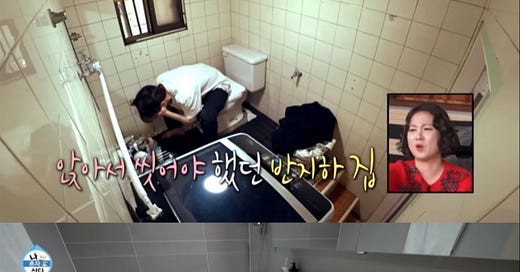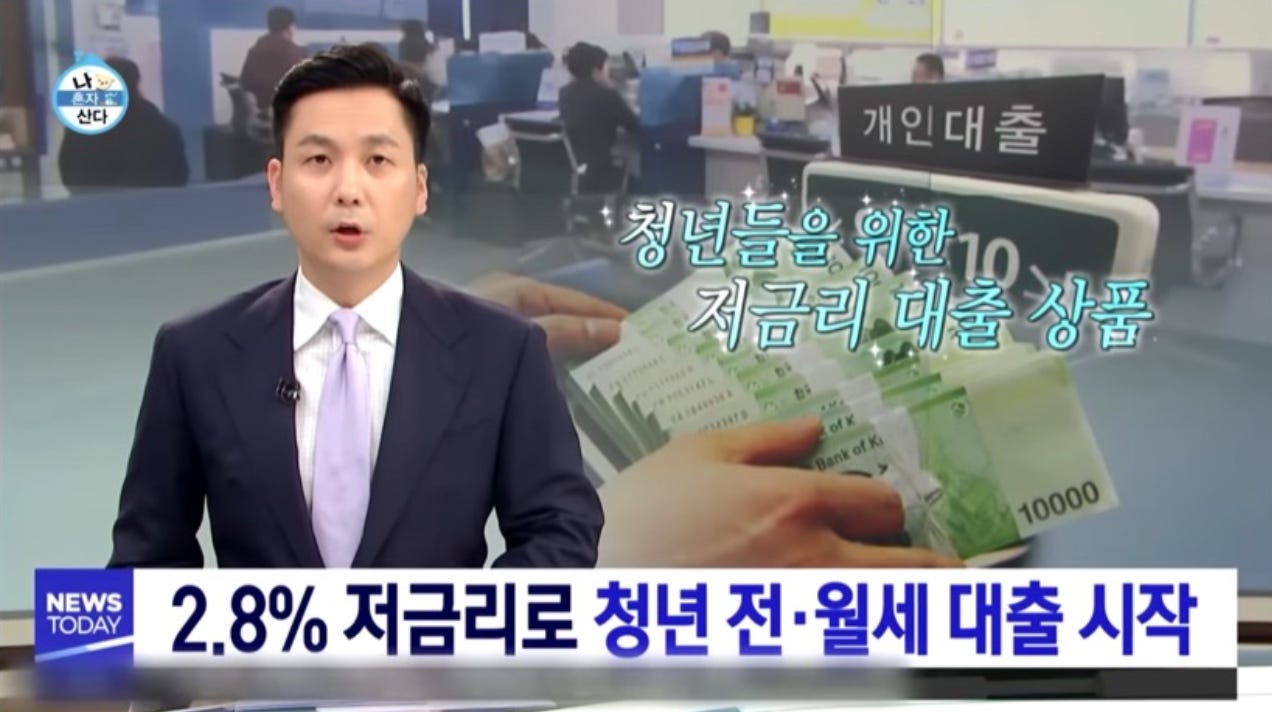From ‘Parasite’ Semi-Basement to Three-Room Apartment
How Korean Tenants Are Being Drowned in Loans
안녕, it's Ari, your talkative Korean friend and weekend reminder. 🎉 It's been a while. I took another long break due to my wrist pain. During the break, I took many tests to identify the cause of the pain because none of the treatments have been really effective so far. Next week, I will get an MRI to see if I have cervical herniated disc, which I was told can be a cause of wrist pain. Please wish me luck. 🫠
Today’s newsletter is about strange Korean housing rent system and its impact on the economy. Let’s start!
What It Takes to Go From ‘Parasite’ Semi-Basement to Three-Room Apartment
Lee Eujin, a rookie Korean actor recently showcased his new house on the popular TV show "Home Alone," where celebrities share their daily lives and homes. In his second appearance on the show, he revealed his spacious 3-room apartment, a stark difference from the small semi-basement house showcased in his initial appearance. In his previous residence, he had a toilet 👆 that looked identical to the one in the semi-basement house featured in "Parasite," a black comedy Korean movie. However, in his new home, he even has a hallway and a dressing room.
The actor was able to move to his new house not because he became rich, but because he did what many young Korean tenants are doing—getting a rent deposit loan.
In Korea, there are two ways of renting a house. One is monthly payment rent, which is common in other countries as well. The other is deposit-only payment rent, a unique arrangement that exists only in South Korea. The latter is called 전세 or "jeonse" in Korean. The way it works is that a tenant provides a substantial deposit to a landlord. When the rent period concludes and a new tenant with the deposit comes, the old tenant receives the money back from the landlord, more precisely, from the new tenant. There are no monthly payments in the meantime.
The amount of jeonse deposit can vary for different houses and locations, but usually, it's expensive. For example, even for a small studio in Seoul, it usually starts from around 70,000 USD. Because the money is substantial, jeonse was not popular among young tenants until interest rates plummeted, especially during the pandemic. Suddenly, paying monthly rent became more expensive than paying the monthly interest of the deposit loan to the bank. Thanks to jeonse deposit loans, a large number of young Koreans, including ones who just started their first job and newlyweds, were able to move to bigger houses, paying less money. Lee revealed that his jeonse deposit for the new house is about 153,800 USD, and his monthly interest rate for the deposit loan (80% of the deposit) is almost the same as the monthly rent of the previous house, around 270 USD.
However, as interest rates rise rapidly and house prices plummet in the past year, many tenants are unable to get back the deposit from landlords. Due to high-interest rates, many people are switching to monthly rent. Landlords are having a hard time finding new jeonse tenants to pay for the deposit to old tenants. Some landlords even simply disappear with the deposit after selling the house, leaving the tenant with a significant loan to pay and no house to live in. This is why when the episode featuring the Korean actor aired, many people commented, "Will he be able to get back his money?"
The concept of jeonse deposit is fascinating—it essentially represents a debt from the tenant to the landlord. However, viewed from another perspective, it also becomes the tenant's debt when the tenant obtains a loan to pay for the deposit. In either case, it contributes significantly to Korean household debt.
By 2022, the total amount of jeonse deposits is 814 billion USD, 😱 constituting over a third of the total Korean household debt, which is 2.25 trillion USD. Including the jeonse deposit, South Korea's household debt-to-GDP ratio is a whopping 156.8%, 😱😱 securely placing the country in first position among OECD countries.
One last thing to share is a fun movie promotion culture. In Korea, when a new movie is released, the director and actors visit movie theaters all over the country to greet audiences. Before the movie starts or after the movie finishes screening, the director and actors enter the auditorium, say hi to the audience, give out autographed posters, and sometimes take selfies with the fans. This promotion culture is called “무대인사“ or “stage greetings.” Thanks to this, it's not that hard to see a Korean actor in person. Right now, a Korean historical drama film called “12.12: The Day” is sweeping the nation, attracting more than 7.7 million audiences by Thursday. Best movie of the year! 👍 Its team is on their 5th week of “stage greetings.” Watch the above video to see what it’s like.
Apologies for the absence of an extra lesson for members this week, again. 😭 I’m so sorry ㅠㅠ 🙏 I am exploring ways to make up for the absences for members. And thank you so much for continued support despite of breaks.
Thanks for reading! If you liked my newsletter, ☕️ buy me a coffee ☕️ to support my work. It’ll help me keep writing! I will do my best to be back next week. 안녕!






"Some landlords even simply disappear with the deposit after selling the house, leaving the tenant with a significant loan to pay and no house to live in." Good lord, that's a terrifying possibility! That system seems fraught with danger.
I hope your MRI helps gives the doctors a clue as to what's going on with your wrists. Do not even worry about needing to "make up" for anything. Just keep taking care of yourself!
손목이 아픈데 기사를 써주셔서 감사합니다. 🙏
전세라는 거 신기아네요... 몸조리 잘 하세요!